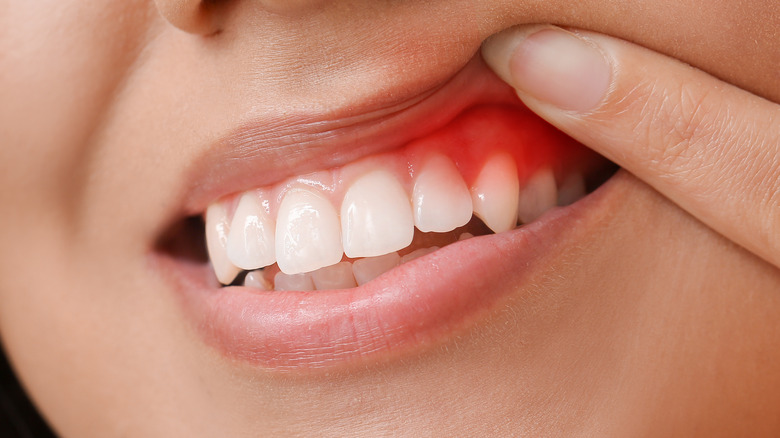Common Symptoms Of Gingivitis To Be On The Lookout For
According to Mayo Clinic, gingivitis is an oral disease that affects the gingiva — the part of the gum that supports the base of your teeth. Per Dr. Jay Khorsandi, gingivitis is the early stage of a bacterial infection in the gum or near the tooth (via Byte). It is usually caused by plaque deposition on the teeth. Statistics by the Arizona Periodontal Group reveal that around 50% of Americans may have gingivitis. This gum inflammation may also be caused by whacked-up hormones, particularly during menopause, pregnancy, or puberty, explains Medical News Today. In addition, some people may experience symptoms of gum disease if they have chronic illnesses such as diabetes or HIV.
Regular smokers may also be at a high risk of gingivitis. In some cases, a family history of this periodontal disease may also be a factor that leads to gingivitis in future generations. Proper flossing or brushing is the best way to prevent gingivitis. On the other hand, getting the right treatment at the right time can certainly help save your teeth, and for that purpose, it's worth knowing how to recognize the signs of gingivitis.
What are the signs of gingivitis?
According to Lane and Associates Family Dentistry, gingivitis may cause your breath to smell like rotten eggs or sulfur. This foul odor is caused by the chemicals released by the bacteria as they feed on the dental plaque. The best way to eliminate the bad smell is by brushing properly and daily. Moreover, using a dentist-approved mouthwash can help get rid of the smell. Per Medline Plus, another common gingivitis symptom is bleeding gums. The bleeding occurs because of the stiff plaque around the teeth, which, when brushed roughly, injures the gums.
Gums with gingivitis may also appear red, swollen, and severely inflamed, warns Mayo Clinic. The gums may also feel tender, so if you bite down hard on food or consume foods or drinks with strong temperatures, it may lead to gum pain. According to Cleveland Clinic, many people may also notice receding gums, which are a sign of gum disease. In other words, the gum line may pull upward, and as a result, your teeth may become more exposed or prominent. Mayo Clinic recommends booking an appointment with your dentist at the first signs of gingivitis to control the disease immediately.


